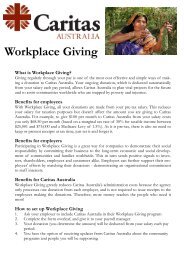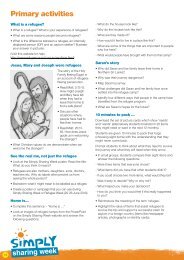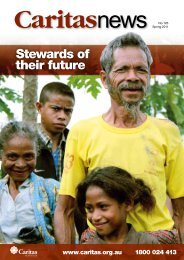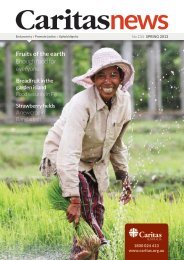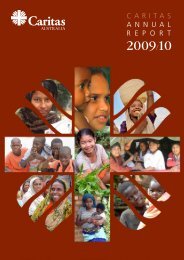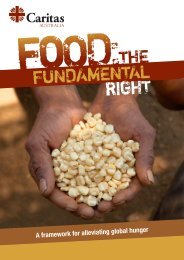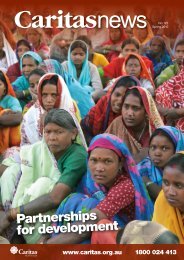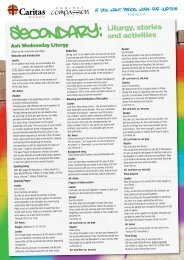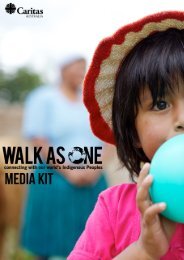View online - Caritas Australia
View online - Caritas Australia
View online - Caritas Australia
- No tags were found...
Create successful ePaper yourself
Turn your PDF publications into a flip-book with our unique Google optimized e-Paper software.
FEATURE“We believe itis far betterto help wholecommunitiesthroughour partnerorganisationsthan to sponsorindividuals.”IT WORKS TOO. Child sponsorshipprograms bring in hundreds of millionsof dollars every year to ‘tackle poverty’,just in <strong>Australia</strong>. But beyond theemotional pull of such images, carefullytargeted to elicit guilt and a monetaryresponse, the question remains do theyreally work?Well the answer, like most things, iscomplicated. Reading the fine print ofmany of these child sponsorship salespitches informs you that the moneydoesn’t actually go to the person, usuallya child, depicted on the photo they sendyou when you sign up. Funds are nowmost often distributed to the entirecommunity. This is a recent developmentand has come about in clear recognitionthat it is only through assisting an entirecommunity that our aid money can everreally make a sustained difference.These sales pitches, where thedonor is asked to virtually purchase achild for upwards of $30 per month,propose difficult ethical questions foraid organisations. Yet they deliver suchhuge benefits in terms of earnings forthe agencies, that sometimes the ethical CARITAS NEWS
community, but even then, the mechanicsof sponsoring, recording the progressof each child, translating letters, takingphotos, costs a lot of money. This ismoney which is being spent on the needsof the donor, not of the child.At <strong>Caritas</strong> our development philosophyis rooted in the principle that we, inthe rich world, cannot alone resolvethe issues that perpetuate poverty. Infact dehumanising poverty can onlyever be overcome when a communityis empowered to own the process of itsdevelopment. In this way, we work withentire communities, often with thepoorest of the poor in already very poorcommunities, to bring dignity to theirlives and to build a path by which theythemselves can be the architects of theirown development.Many organisations that promote childsponsorship mention their communityfocus in the fine print because the powerof the emotional pull of the young child,full of potential, is a much strongertrigger to give than the community-basedmethod. Child sponsorship creates astrong personal connection between thewell meaning giver and the ‘poor’ child.The added bonus is you can see thepicture of that child on your fridge andit proves a valuable educational tool foryour own, relatively well off children, thatlife is not so good for everyone. There aremany hundreds of organisations involvedin international development in <strong>Australia</strong>.Internationally there are many thousandsof organisations who aim to assist thoseliving in dire poverty. It is often difficultfor the person who wants to make adifference to choose between the manygroups who do this. The competition inthe aid and development sector, in largepart due to the growing awareness ofinternational poverty issues, is exceedinglydiverse.Many groups who are engaged withtackling poverty have a religiousconnection, like <strong>Caritas</strong> <strong>Australia</strong>.Yet <strong>Caritas</strong> <strong>Australia</strong> does not everproselytise, or attempt to convert peopleto Catholicism or any other religion.Similarly we do not discriminate on anymeasure except need.Regardless of the religion, ethnicity,culture or gender, <strong>Caritas</strong> <strong>Australia</strong> workswith those who are most vulnerable. Theirfaith, or lack of it, is of no interest to us.Some of our partners are Catholic, othersChristian, some are Buddhist, Muslim,Jewish or Hindu and some are of noreligious persuasion at all. As long as theyare building communities to take controlof their futures, we do not discriminate.The <strong>Caritas</strong> <strong>Australia</strong> mission, as partof the Catholic Church, clearly states thatwe must undertake this endeavour. Wework through local partners, many ofthem members of the Catholic Churchand the church’s network.<strong>Caritas</strong> works for the freedom of thosewho are oppressed by injustice, bringing‘sight’ to both those who are powerless andpowerful and proclaiming to the poor thegood news of their human dignity. Thisissues don’t get much consideration.<strong>Caritas</strong> <strong>Australia</strong> very clearlychooses not to promote childsponsorship. We believe it is farbetter to help whole communitiesthrough our partner organisationsthan to sponsor individuals. Avillage well, a community school,a trained primary health worker –these can all help to improve lifefor everyone, rather than just anindividual child.Some sponsorship schemes dosupport projects that benefit theCARITAS NEWS
work is undertaken principally throughthe life-giving activities of humanitarianaid and long-term development. At<strong>Caritas</strong> we realise that we alone cannoteffectively tackle the structures whichkeep communities, families and peopletrapped in the strictures of poverty.The only way to effectively andsustainably tackle poverty is to assistcommunities and people to do itthemselves.We are governed by the principlesof Catholic Social Teaching whichwork as the fundamental principles onwhich all our work is built, but we arenot missionaries. In fact, to insist onCatholicism as a condition of our supportwould contradict our principles. Putsimply, ‘development’ and ‘aid’ are whatwe do, ‘Catholic’ is why we do it.<strong>Caritas</strong> delivers humanitarianassistance and in many cases ouremergency response helps save many lives.Yet keeping people alive is no cure todegrading poverty.People here in <strong>Australia</strong>; the people whowork in developing countries as ourpartners; the people in the communitiesthat they in turn work with andthe many hundreds of thousands ofChurch and community organisationsand groups; people like you, are thepartnership that can really tackleinjustice and free the world from poverty.Crucially we also work throughpeople here in <strong>Australia</strong>. <strong>Caritas</strong>recognises that without practisingsolidarity here in our own country,without us promoting justice bothinternationally and domestically, we cannever effectively change the structureswhich keep people trapped in the cycleof poverty.<strong>Caritas</strong> <strong>Australia</strong> doesn’t parachute aidinto the 35 countries in which we work.By working together, in partnershipwith communities on the ground; theones who are the most affected; whobest understand the local situation andculture; and who ultimately will be theguardians of change, we are best placedto deliver positive change that will beappropriate, life giving and sustainable.Poverty is political – there’s no wayaround that. When 1 billion people arehungry, yet the world produces morethan enough food to satisfy everyone,something is fundamentally wrong.When people struggle to get enoughfood to eat, struggle to send theirchildren to school, struggle to accesshealth care or are not treated withdignity in their society – this is political.Despite the wealth in the world neverhaving been so great, we have to askwhy, we have to ask who is responsible,and we have to get our political leadersto change the situation for the better.<strong>Caritas</strong> though is never party political.We are interested only in changingpolicies to benefit the poor. We fight forjustice. In this pursuit, we will talk toand challenge whomever can make thishappen.The vast majority of <strong>Caritas</strong> <strong>Australia</strong>’sfunding comes from people like you. Weget no direct funding from the CatholicChurch. Members of the public, oftenChurch goers, but not always, anyonewho cares about righting the imbalancethat exists between the rich and poorworlds, can and do give to <strong>Caritas</strong><strong>Australia</strong>.Ultimately, <strong>Caritas</strong> is yourorganisation, you allow us to existbecause you care; hence we areanswerable to you.The remainder of our supportcomes from governments, internationalinstitutions, trusts and foundations, plussome income from our investments andtrading activities. This year, less than15 percent came from governments andinstitutions. Our board has set a ceilingon how much money we can take fromgovernments of 30 percent to ensure wecan maintain our independence.Our money goes directly to our localpartners – the people working on theground, directly responsible to thecommunities they are working in. InIndia, Indonesia and Sri Lanka, your
money enabled our partners to help halfa million people begin to return to somesort of normal life after the Indian Oceantsunami.Your contributions made it possible forus to respond quickly and effectively to adrought in Zimbabwe so harsh that thefields were bare and food was running out.You helped us raise the profile ofthe Democratic Republic of Congo in<strong>Australia</strong>, raising the profile ofsome of the most vulnerable women inthe world and helping them to achievetheir innate human dignity.You helped us get people out onthe streets for Make Poverty Historyand enabled us to get over a million<strong>Australia</strong>ns to Stand Up Against Poverty.We do not give aid to governments. Thatway, corrupt governments can’t misuseour funds.We do recognise that governmentsare crucial to tackling the problem ofpoverty and hence we do sometimeswork with governments such as in thegroundbreaking PASHIP program inPNG, which is effectively tackling HIV inour nearest neighbour with the <strong>Australia</strong>nand PNG Governments.To ensure our partners aren’t corruptand that our money is spent effectively,we have a detailed process for evaluatingpartners and projectswhich is as robust as anysystem implementedby financial institutionsaround the world.Whenever we arealerted to a misuse offunds – which is extremelyrare – we immediatelyinvestigate and take theappropriate action whetherthat be legal or otherwise.Corruption occurseverywhere, not just inthe developing world,and our partners dealwith the consequencesof corruption every day. Of coursecorruption affects the poorest the hardest– the ones who have to pay a bribe to getthrough the military cordon so they canget their goods to market, that have to paya bribe to get their children’s results fromschool. Corruption must be tackled andempowering communities to be able toeffectively locate and combat corruption isfundamental to tackling poverty.Ultimately,<strong>Caritas</strong> is yourorganisation,you allow us toexist becauseyou care;hence we areanswerableto you.When we plan any new project,our staff and partners always checkwhether there are any other agenciesworking in the same area, and whetherwhat we are planning to support willcomplement or duplicate the work theyare doing.<strong>Caritas</strong> <strong>Australia</strong> is a member of <strong>Caritas</strong>Internationalis, one of the largest aidand development networks in theworld operating in over 200 countriesand territories. When an emergencyhappens we collaborate through<strong>Caritas</strong> Internationalis to coordinatethe responses from themany <strong>Caritas</strong> membersacross the globe. Thisincreases our impactand our effectivenessby using the manyand varied skills of theglobal <strong>Caritas</strong> staff andto bring together underone umbrella all of ourcombined resources.We are also partof alliances includingthe global ecumenicalnetwork Action byChurches Together, the<strong>Australia</strong>n Council forInternational Development, and wereceive support from the World FoodProgram and other multilateral bodies.Every aid agency is different. Many justfocus on the individual or on a particularreligious or ethnic group or community –or they specialise on a particular sectoralissue such as water and sanitation,agriculture, shelter etc.<strong>Caritas</strong> <strong>Australia</strong> is different in manyways to other aid organisations. We workdirectly in over 35 countries and arefocused on empowering communities totake control of their own futures.This is harder work than just handingout food or building a hospital. Althoughwe do conduct these activities too, ourgoal is to give communities the tools totake control and be sustainable. It takes along-term commitment but it is the onlyway we can ever truly wipe out poverty.<strong>Caritas</strong> <strong>Australia</strong> has clear goals whichguide us and our work to eliminatepoverty and injustice.New partners are selected to helpus meet these objectives. We formallyassess each prospective partner to checkthey share our goals and have the kindof robust financial and organisationalstructures, skills and capacity to helpdeliver them.Child sponsorship offers an easy wayto begin the learning journey aboutinternational poverty. Ultimately though,it isn’t solving the problem. Partnershipis the key to solving poverty in the longterm. At <strong>Caritas</strong> we also recognise thatwe alone cannot solve the issue of globalpoverty – we can and are though makinga real difference in the lives of tens ofthousands of people.By working together withcommunities on the ground and givingthem the power to articulate their owndevelopment futures and work out aplan to achieve this vision we are reallychanging things for the better. This ishow you can really make a difference.Supporting agencies like <strong>Caritas</strong> iscertainly a step in ridding the world ofdehumanising poverty.CARITAS NEWS



